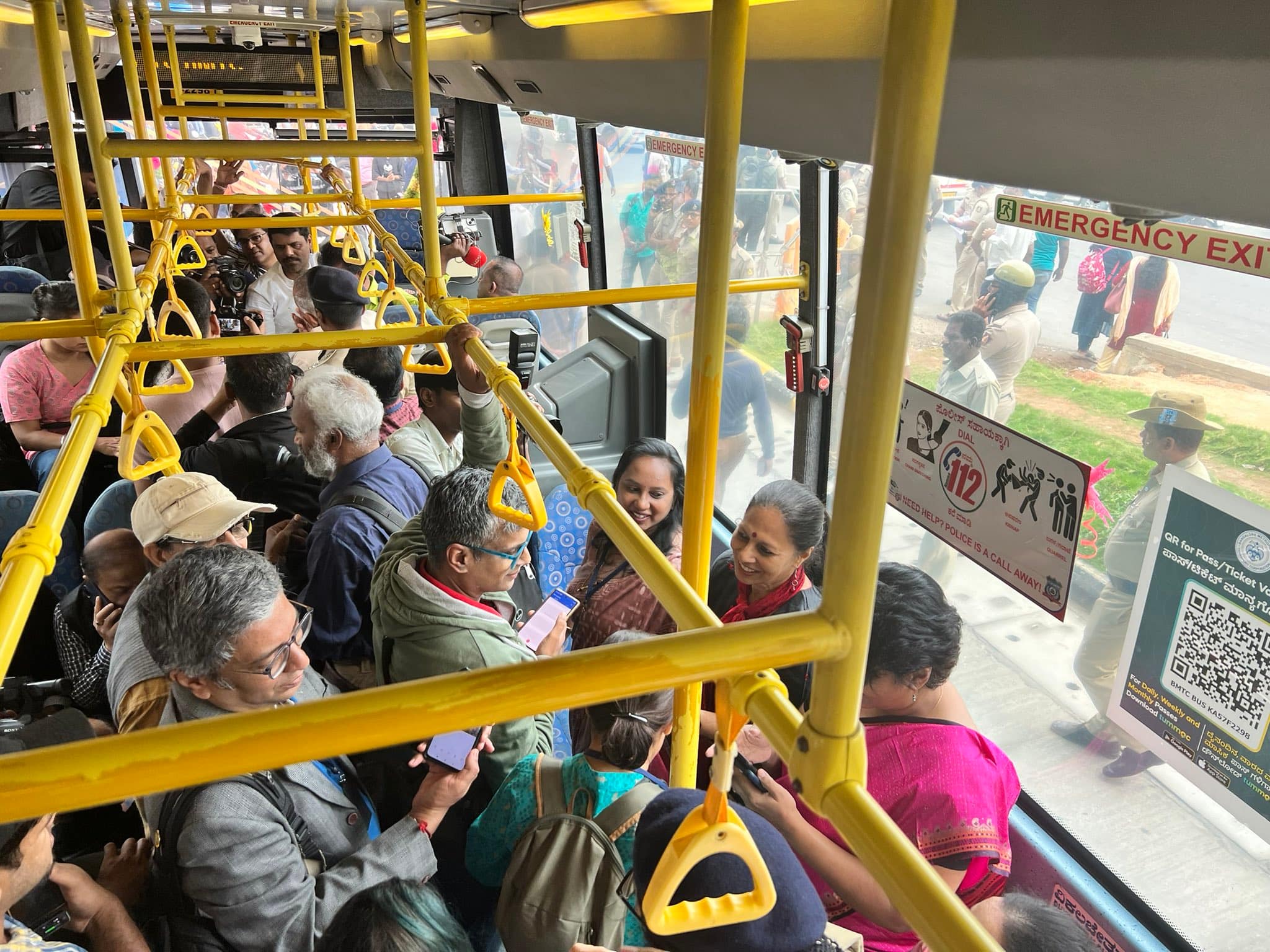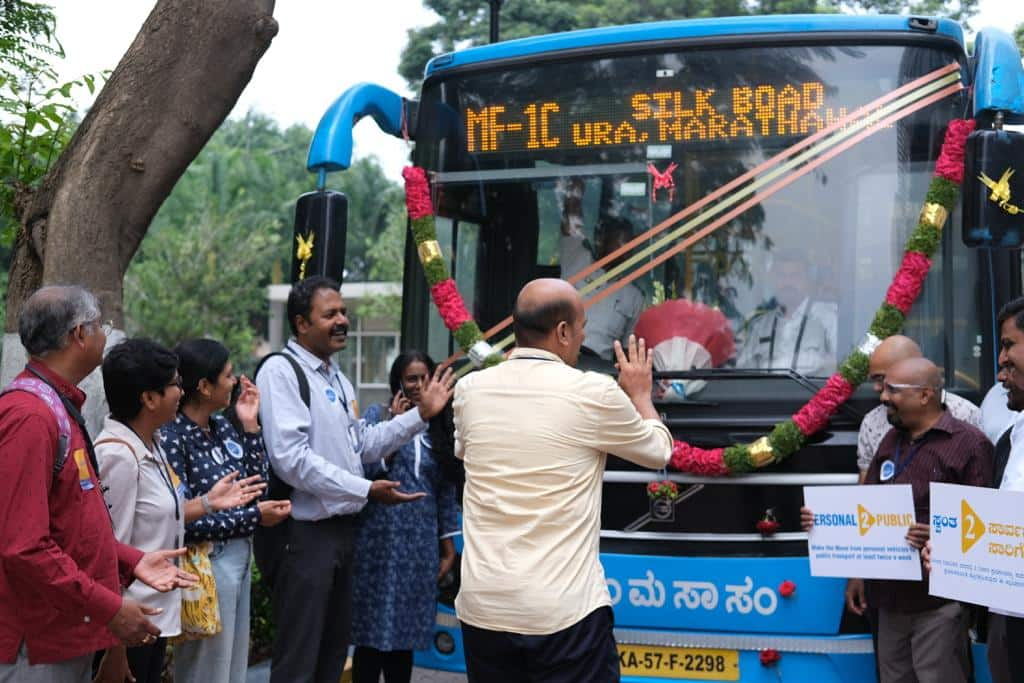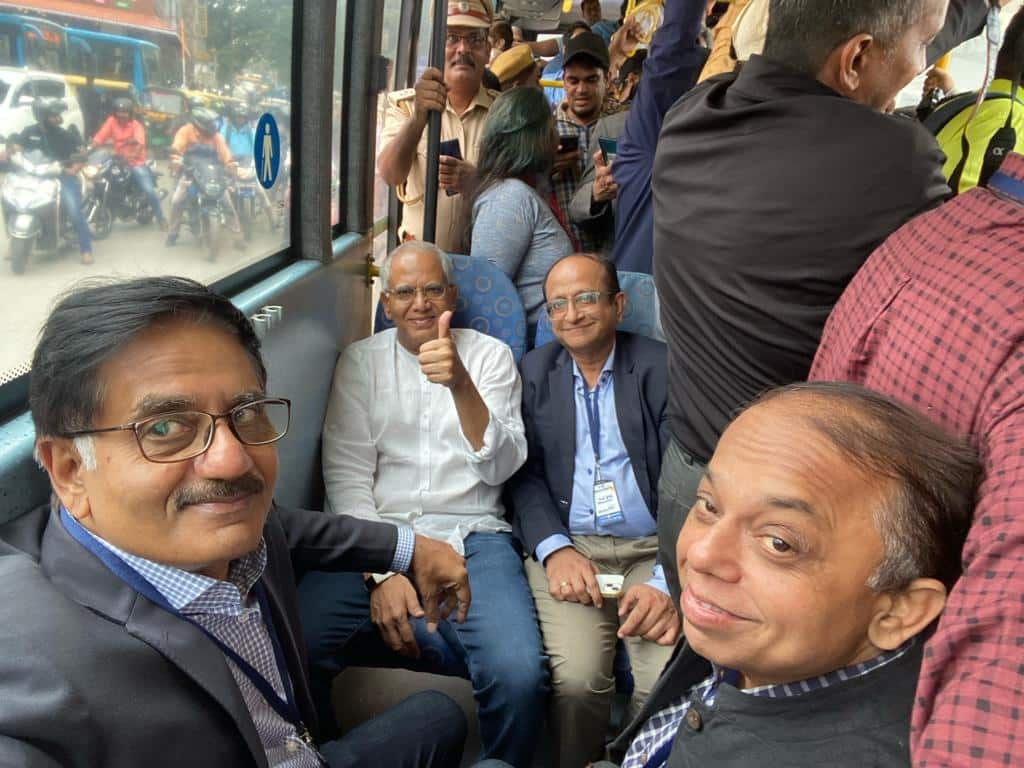



With the complete operation of Bengaluru Metro's Purple Line (Challaghatta-Whitefield), a diverse range of stakeholders, including government agencies, corporate entities, citizen groups, and others, are now taking steps to reduce traffic congestion in Bengaluru's tech corridor.
On October 11, Karnataka transport minister Ramalinga Reddy, MV Rajeev Gowda, vice-chairman of the State Institute for Transformation of Karnataka (State Planning Board), senior government officials, and corporate leaders boarded BMTC feeder buses from KR Pura Metro station.
Also, read: First-person account: A 43-km Metro ride from Bengaluru's tech hub Whitefield for Rs 60
The first bus left from KR Pura station at 9:25 am, and reached at Intel's RMZ Ecospace office in Bellandur around 9:55 am. They participated in the 'Personal2Public' campaign by pledging to use public transport at least twice a week. The entire Whitefield-Challaghatta Metro corridor (Purple Line) commenced passenger service on October 9.
Here’s how a bus full of Politicians, IAS and IPS and CEOs and Activists and of course the wonderful members of the Bengaluru media looks like #Personal2Publicpic.twitter.com/cT0DnKQo9b— Srinivas Alavilli (@srinualavilli) October 11, 2023
Also, read: Bengaluru car users spend 1-1.5 hours in each direction; 95% keen to shift to Metro: Survey report
Bangalore Metropolitan Transport Corporation (BMTC) on October 11 also launched high-frequency feeder buses, running every five minutes during peak hours and every eight minutes during non-peak hours, connecting KR Pura and Central Silk Board.

Representatives from companies such as Intel, Oracle, Goldman Sachs, and VMware were part of the initiative to promote public transport among employees working on ORR.
According to a Outer Ring Road Companies Association (ORRCA) report, which represents the ORR's technology parks, IT/ITeS companies, and software development and research centres, traffic congestion on Bengaluru's tech corridor (17 Km KR Pura and Central Silk Board) costs $15 billion annually. The report highlights that 9.5 lakh people are employed in more than 500 companies in the tech corridor, and 36 percent of Bengaluru's IT revenue, totalling $32.68 billion per year, is generated from the KR Pura to Silk Board section of ORR.
Also, read: 5 reasons why Bengaluru's ORR faced unusual traffic congestion on September 27
Promoting public transport"This marks a promising beginning," said Ramkumar Narayanan, VP of Technology & Managing Director at VMware. "With two campuses, one in JP Nagar and another in ORR, where a total of 8,000 employees work, we follow a hybrid work model. A robust public transport system will not only enhance mental and physical well-being but also boost productivity."
Also, read: Traffic cops propose carpooling, shuttle buses to ease congestion on Bengaluru's Outer Ring Road
RK Misra, co-founder of the mobility startup Yulu, commended corporate leaders for embracing public transport. "With over 1 crore vehicles in Bengaluru, around 30 lakh vehicles are found on 1,000 km arterial roads at any given time. This translates to around 3,000 vehicles per km, making promoting public transport the only viable alternative."

Misra suggested that the bus priority lane on ORR should be reinstated, at least between Ibballur and KR Pura, where Metro pillar work is completed. "When car users realise that buses in dedicated lanes are faster, they will naturally make the switch," he said.
Also, read: Why Bengaluru's tech corridor, Outer Ring Road, needs an urgent fix
Krishna Kumar Gowda, Operations Manager at ORRCA, said, "ORR sees more traffic congestion on Tuesdays, Wednesdays, and Thursdays when most employees work from the office. If employees use public transport twice a week, it would lead to reduced traffic on ORR."
He also noted that the Blue Line (KR Pura - Central Silk Board) will be completed by 2026, and the Yellow Line (RV Road- Central Silk Board - Bommasandra) is expected to be operational in Q1 2024. "The feeder bus services will connect the Purple Line's KR Pura station and Yellow Line's Central Silk Board station until the Blue Line is ready."

Muthu Ranganathan, senior director (product management) at Oracle, pointed out that with the Byappanahalli-KR Pura Metro section now connected, people save at least 30 minutes. "Having feeder buses available every five minutes during peak hours is a welcome move," he said.
Today I represented Oracle & other outer ring software companies as part of the pledge for public transport, and #Walkthetalk Kudos to @srinualavilli & entire team! pic.twitter.com/p9OY7n3Hdr — Muthu Ranganathan (@muthurangnathan) October 11, 2023
He asked all employees not to buy new cars and, if they do, to use them exclusively for outstation trips. Ranganathan noted that he has been using office shuttle buses with fixed timings from the Metro station, and with improved feeder buses, employees can use them at any time.
Also, read: Bengaluru Metro to enable private firms to recharge employees' smart cards
Shailesh Jadhav, vice president and global head of HR at Mirafra Technologies, said, "I used to spend around two hours each way commuting by car from my residence in Kammanahalli to the office in Whitefield. I have to go to the office five days a week, I would spend nearly one day each week in traffic, which equates to three days per month on the roads. Since the entire Purple Line is now operational, I now park my car at Byappanahalli Metro station from home, a journey that takes around 15-20 minutes. I then take the Metro to Nallurhalli station, which adds another 20-25 minutes to reach our office. We can manage our work, but traffic remains a major issue."
Government officials join the campaignMN Anucheth, Joint Commissioner of Police (traffic), Bengaluru City, emphasised that more people using public transport would also ease the burden on traffic police managing the city's traffic.
Also, read: Bengaluru’s seething tech corridor calls for timely advisories, efficient public transport
He suggested starting with a commitment to using public transport twice a week. He also pointed out the 20 percent reduction in traffic on Old Madras Road after the entire Purple Line became operational, with several junctions like NGEF, Byappanahalli, and Tin Factory seeing a significant reduction.
BMTC officials said they will operate more buses to complement the Metro rail system. BMTC managing director G Sathyavathi said, "Corporates should work with the government instead of complaining. In fact, corporates could adopt some bus shelters. We are also planning to induct 320 AC electric buses, and a significant number of the Vayu Vajra airport diesel buses will be replaced with e-buses. We are inducting an additional 2,000 new buses into our fleet and also recruiting additional staff. We also invite corporates to contribute by offering skill development training for our employees, including drivers."
Also, read: Bengaluru to get 320 AC electric buses; Koramangala flyover work set to resume
Campaigners MV Rajeev Gowda, Revathy Ashok, CEO of Bangalore Political Action Committee (B.PAC), and Srinivas Alavilli, fellow at the World Resources Institute (Integrated Transport and Road Safety), described this initiative as 'walking the talk' and a part of the 'Personal2Public Transport' campaign.

Gowda highlighted the Congress party's commitment to increasing the public transport share in the city to 70 percent, emphasising the importance of this pledge in addressing a major issue in the city.
Ashok urged the state government to increase the number of BMTC buses from 6,600 to 15,000 and restore bus lanes on ORR to promote public transport.
Also, read: Bus priority lane to return on Bengaluru’s Outer Ring Road after Metro work
Alavilli said: "It's a unique initiative in India where politicians, IAS and IPS officers, CEOs, and activists all took a bus to encourage others to use public transport to reduce congestion". He quoted Gustavo Francisco Petro, the president of Colombia, emphasising that a developed country is one where the rich use public transportation rather than the poor having cars.
Also, read: Startup hub Bengaluru: What makes it the world's second slowest city
Discover the latest Business News, Sensex, and Nifty updates. Obtain Personal Finance insights, tax queries, and expert opinions on Moneycontrol or download the Moneycontrol App to stay updated!
Find the best of Al News in one place, specially curated for you every weekend.
Stay on top of the latest tech trends and biggest startup news.